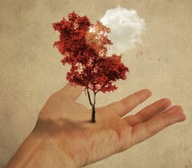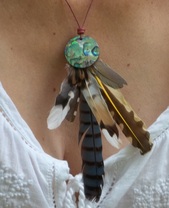
Some of you are well-acquainted with our health care system's well-oiled (or in some cases, not so much) cancer care machine. If you become a patient, it goes like this: symptoms -> tests -> diagnosis -> plan -> treatment -> follow-up -> follow-up -> follow-up. Once you're plugged in and on the conveyor, if you're at a large medical centre you may meet a dozen people who will be involved in your care. Most of them will be excellent at their jobs (if a bit tired from overwork) but rely heavily on the rote method of dealing with your "intake" and "processing" through all the phases of your care. With true respect and sincere gratitude for how hard these people work: there are very few original thinkers in the above-described scenario, and even fewer true healers. No matter how well-intended, the system does not allow for any deviation. If you're fortunate, you'll feel a real confidence in your oncologist as a good diagnostician and excellent technician, and have a crackerjack nurse you can direct all your questions to. This is a wonderful thing, a great privilege in this world, and the best we can hope for. Yet there are rare individuals working in the system who manage, by some grace, to bring a bit of something special to the table. In all my years as a nurse I'm reasonably sure I can count the ones I've met on two hands. I met one of those, an oncologist, the other day.
I accompanied my friends Andy and Helen to their first clinic visit on the road to Andy's healing from colon cancer. We attended a beautifully appointed free-standing cancer care centre and it was a confidence-inspiring setting to be in, if a bit impersonal. We awaited Andy's care team-to-be in a small examination room, and eventually the junior surgeon appeared and stayed for a lengthy visit. I can say without a doubt he was, as surgeons go, the best teacher I have ever met (and I've been to scores of these first appointments). I was grateful for his communication skills and transparency; I had to ask very few of the hardball questions I was there to ask, as he explained things so beautifully. And, I was thrilled for my friend Andy to find himself in such good care. But the best was yet to come. Dr. A eventually left us to make some inquiries about Andy's case, and he returned with the chief of surgery for this division, and the rest of the team. The primary nurse/case manager made a huge impression on Andy (rightfully so - she is a gem) and he developed an immediate rapport with his new medical muse. But I was struck by the chief oncologist. His presence - and he was SO VERY present - was outside the box in some way. I studied him as he spoke with Andy and Helen. He was relaxed. He was all there. He was not dragged down by the system and its overwork, though he was an older man, and a professor as well as chief surgeon (and who knows - maybe a family man as well). Then he said some things that were very much not part of the usual script. He said he doesn't believe in predictions; he is very much a one-step-at-a-time kind of guy. He said he isn't fussy about certain things (and mentioned a few things that other docs are typically very fussy about). He radiated a peaceful confidence and authority that came from the wisdom of experience. But there was more there: love. As unlikely as it seemed, this man was anchored in it, unshakeable. As he wrote up his paperwork he asked me about the nature of my relationship with Andy and Helen, and we responded that I am a friend. Still looking down at his papers, he said gently "oh? then you're not in the medical field in any way?" Busted. (How do they always know?) I responded that I'm a nurse, but was there as a friend and fellow cancer survivor, ovarian, to be specific. He asked kindly who had cared for me and I told him; it was someone he knew. Moments later the session wrapped up, and the team all shook hands with each of us. As Dr. S, chief of surgery, left the room, he stopped ever so briefly beside my chair and laid his hand on my shoulder. Acknowledgement and compassion flowed from his hand. I was stunned to recognize the touch of a true healer. A healer who is surviving as such in a system that seems designed to make such a feat impossible. It was a bright, unforgettable moment, filled with hope.
For the next day and a half, I was a bit undone. I cried easily, with no clue as to why. Then I realized: it was that compassionate touch by a knowing stranger, that acknowledgement of what I had been through, delivered with love and understanding. After such a long spell of being strong, of steering the bow straight into the waves in the storm, I cried over the immensity of it all. And I cried for joy that this was the man who would be looking after my friend Andy.
Dr. S has, I'm sure, no clue of his effect upon me, and probably upon others far too numerous to count. He was just being himself. That's the power we have. A good reminder to me to *always* be my best self, 'cause you never know what the ripple effect might be.

 RSS Feed
RSS Feed